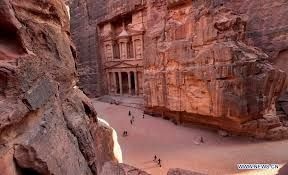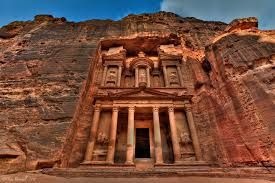Petra (Arabic: البترا, Al-Batrāʾ; Ancient Greek: Πέτρα) is a historical and archaeological city in the southern Jordanian governorate of Ma'an that is famous for its rock-cut architecture and water conduit system. Another name for Petra is the Rose City due to the color of the stone out of which it is carved.
Established possibly as early as 312 BC as the capital city of the Nabataeans,[3] it is a symbol of Jordan, as well as Jordan's most-visited tourist attraction.[4] It lies on the slope of Jebel al-Madhbah (identified by some as the biblical Mount Hor[5]) in a basin among the mountains which form the eastern flank of Arabah (Wadi Araba), the large valley running from the Dead Sea to the Gulf of Aqaba. Petra has been a UNESCO World Heritage Site since 1985.





